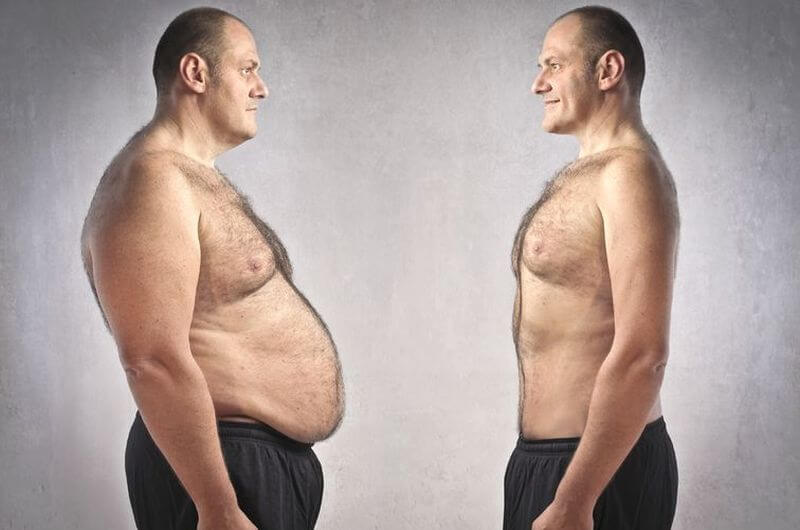These days, we’re told that just about everything can automagically make us gain weight.
You know…
- Gluten
- Grains
- Sugar and high-fructose corn syrup
- Carbs in general
- Processed foods
- Fruit
- Dairy
- And on and on.
Different diet “gurus” have different dogmas, but they all share the same fundamental philosophy:
That you have to “eat clean” to get lean, and that weight gain is caused by eating the wrong foods.
Well, they’re absolutely wrong—weight gain isn’t caused by what you eat but how much—but that’s another discussion.
We’re here to talk artificial sweeteners and weight loss, which is an equally controversial subject.
These chemicals contain far fewer calories than traditional sweeteners like sugar and honey, which led researchers to believe that their widespread adoption should curb obesity rates.
Well, it hasn’t. We’ve just gotten fatter and fatter.
Why?
Are artificial sweeteners contributing to the obesity crisis? Can they somehow make you fatter, or at least more likely to gain weight?
Let’s find out…
What Are Artificial Sweeteners?

Artificial sweeteners are manmade chemicals added to foods to make them sweet.
They work by triggering the “sweetness receptors” on your tongue in the same way as sugar.
There are two major differences between them and sugar, though:
- They’re much sweeter.
- They aren’t digested and absorbed in the same way, making them much lower in calories.
Here’s a quick summary of the most popular artificial sweeteners in the US and EU:
- Aspartame
Aspartame is 200 times sweeter than sugar. The branded products Nutrasweet, Equal, and Sugar Twin are aspartame.
- Acesulfame potassium
Acesulfame potassium is also known as acesulfame k or Ace K, and it’s 200 times sweeter than sugar. The branded products Sunnet and Sweet One are Ace K.
- Advantame
Advantame is 20,000 times sweeter than sugar.
- Aspartame-acesulfame salt
Aspartame-acesulfame salt is 350 times sweeter than sugar The branded product Twinsweet is aspartame-acesulfame salt
- Neotame
Neotame is 13,000 times sweeter than sugar. The branded product Newtame is neotame.
- Saccharin
Saccharin is 700 times sweeter than sugar. The branded products Sweet’N Low, Sweet Twin, and Necta Sweet are saccharin.
- Sucralose
Sucralose is 600 times sweeter sugar. The branded product Splenda is sucralose.
Can Artificial Sweeteners Make You Gain Weight?

The short answer is, no, artificial sweeteners can’t directly cause you to gain weight.
They just don’t contain enough calories to move the needle.
But what about indirectly?
Can eating artificial sweeteners somehow, through various trickle-down effects, make you gain weight, or at least make you more likely to gain weight?
Well, that’s a deeper question that requires a deeper answer.
Concerns along this line arose from animal research that suggested there may indeed be a causal relationship between low-calorie sweeteners and fat gain.
For example in one study, scientists gave two groups of rats liquid sweetened with either sugar or saccharin, and unlimited access to rat chow.
By the end of the study, the pups that drank the artificially sweetened water had eaten about four times as much chow as the sugar-fed ones.
Another study found that rats fed saccharin-sweetened yogurt gained more weight and body fat compared to rats fed sugar-sweetened yogurt. A similar study using Ace K-sweetened yogurt produced similar findings.
In each of the cases, the chemical sweeteners appeared to interfere with the rats’ natural mechanisms for regulating caloric intake. Scientists also noted that rats fed the artificial sweeteners experienced a smaller increase in body temperature following their high-calorie meals (indicating a reduction in the thermic effect of food).
There are several factors to consider when evaluating research like this, though, including gender and dietary and genetic elements.
Male rats gained more weight than females, for example, and obesity-prone rats gained weight on the diet of artificially sweetened yogurt while obesity-resistant ones didn’t.
Furthermore, females fed a high-fat, high-sugar diet gained weight after being introduced to artificial sweeteners, but those that previously ate a regular diet of low-fat chow didn’t.
More importantly, though, is looking at what this all means for us humans. After all, we may share ~98% of our DNA with rodents, but we aren’t big rats.
Well, much of the current concern started in 1986, when a large cohort study of 78,694 women found an association between artificial sweetener consumption and weight gain.
That is, it appeared that heavier women tended to eat more artificial sweeteners than lighter ones.
Subsequent research has added weight to these claims, and so they’ve gained entrance to the mainstream health and fitness echo chamber.
Artificial sweeteners are making us fatter, we’re told. End of story.
If we take a closer look at the science, though, it’s not that cut-and-dried.
The first thing we have to realize is the bulk of the research adduced to support this position is observational science that can’t establish a cause-effect relationship.
You’ve probably heard the saying “correlation isn’t causation,” right? Well, that’s what we’re talking about here.
Just because two things appear to be linked (artificial sweetener consumption and body fatness, in this case) doesn’t mean one is causing the other.
Something else could be causing the weight gain (like uh, overeating), and artificial sweeteners might have no bearing on this behavior whatsoever.
In fact, cause and effect might be the other way around, a phenomena known as reverse causation. In this case, the outcome being investigated (weight gain) is causing the predictor (consuming artificial sweeteners).
For example, many overweight people start drinking diet sodas in the belief that it will help them lose weight, but make no other dietary or lifestyle changes. Thus, when they continue to gain weight, artificial sweeteners can become guilty by association.
The type of research that can establish causation, though, is the randomized controlled trial (RCT), which is carefully designed to investigate the effects of a specific intervention.
And when we review the RCTs available on artificial sweetener consumption, the picture becomes clear.
In one such study, participants replaced calorific sweeteners with artificial ones and followed a proper weight loss diet and exercise program. They lost a significant amount of weight–just as much as scientists predicted they would, indicating normal metabolic function.
In another RCT, overweight subjects on a weight loss program were separated into two groups. One drank 12 ounces of water per day and the other drank the same amount of artificially sweetened beverages.
Ironically, the group drinking the sweeteners lost more weight than the water drinkers.
That doesn’t mean that diet soda is better than water for weight loss, of course, but it tells us that so long as you’re in a caloric deficit, it won’t get in the way.
Can Artificial Sweeteners Help You Lose Weight?

Now that you have a deeper understanding of artificial sweeteners, this question may have occurred to you.
And it’s a good one.
Logic would suggest that using artificial sweeteners to reduce consumption of sugar and other calorific sweeteners should help reduce your caloric intake overall, and thus support your weight loss efforts.
Well, there’s research to back up that line of thinking.
Contrary to the research I mentioned earlier, that suggested a connection between weight gain and artificial sweetener use, studies have found that artificial consumption is associated with lower, not higher, body fat levels.
Well, the answer is yes, if used to reduce caloric intake, artificial sweeteners can help you lose weight faster.
The operative words here are “if used to reduce caloric intake,” though.
As energy restriction drives weight loss, anything you do that further restricts energy intake results in faster weight loss.
Whether switching to artificial sweeteners will help you lose weight faster, though, depends on how you’re dieting.
- If you’re strictly following a proper meal plan that accounts for everything you eat and drink, then it can.
- If, however, you’re eating intuitively (no planning or tracking—just going by feelings of hunger and fullness), then going artificial is less likely to help.
This is because while artificially sweetened foods and drinks are sweet and (generally) lower in calories, they don’t result in the same levels of satiety (fullness) and satisfaction as food does.
And the body’s natural response to this partial fulfillment is what you’d expect: get more satisfaction (calories).
This is probably why research shows that many people that consume artificial sweeteners generally compensate for the calories “saved” by eating more on the whole.
Unfortunately, that defeats the whole purpose of swapping the simple sugars for the low-calorie sweeteners. In the context of body weight, calories are calories.
The Bottom Line on Artificial Sweeteners and Weight Loss

By themselves, artificial sweeteners can’t raise or lower your body weight.
Only calories can do that.
When viewed in the context of your diet as a whole, though, they can cut both ways.
Research shows they can passively nudge caloric intake up by stimulating the desire to eat (and especially in people that already eat a lot of sugar), which makes it harder to lose weight.
On the other hand, they can be used to subtract calories from your diet that would otherwise be used on sweet foods and drinks, which makes it easier to lose weight.
Your dietary habits will determine how it goes for you.
If you’re a staunch meal planner, then artificial sweeteners can help you lose weight faster (or at least more enjoyably) because you know exactly how many calories you’re eating every day and why.
If you’re not one for planning and tracking, though, they’re less likely to help because they can cause an uptick in natural appetite, negating any calorie-saving benefits.
What’s your take on artificial sweeteners and weight loss? Have anything else to share? Let me know in the comments below!
Scientific References +
- F, B., & A, D. (2007). Intense sweeteners, energy intake and the control of body weight. European Journal of Clinical Nutrition, 61(6), 691–700. https://doi.org/10.1038/SJ.EJCN.1602649
- DG, L., & C, de G. (2004). Sweet and sour preferences in young children and adults: role of repeated exposure. Physiology & Behavior, 83(3), 421–429. https://doi.org/10.1016/J.PHYSBEH.2004.08.028
- PA, S., C, de G., A, S., MJ, van O., & J, van der G. (2005). Functional magnetic resonance imaging of human hypothalamic responses to sweet taste and calories. The American Journal of Clinical Nutrition, 82(5), 1011–1016. https://doi.org/10.1093/AJCN/82.5.1011
- Miller, P. E., & Perez, V. (2014). Low-calorie sweeteners and body weight and composition: a meta-analysis of randomized controlled trials and prospective cohort studies. The American Journal of Clinical Nutrition, 100(3), 765. https://doi.org/10.3945/AJCN.113.082826
- JC, P., J, B., M, C., HR, W., GD, F., Z, P., AC, W., SS, V. V., SJ, H., C, B., & JO, H. (2016). The effects of water and non-nutritive sweetened beverages on weight loss and weight maintenance: A randomized clinical trial. Obesity (Silver Spring, Md.), 24(2), 297–304. https://doi.org/10.1002/OBY.21327
- GL, B., BS, K., PT, L., SD, K., & J, W. (1997). The effect of aspartame as part of a multidisciplinary weight-control program on short- and long-term control of body weight. The American Journal of Clinical Nutrition, 65(2), 409–418. https://doi.org/10.1093/AJCN/65.2.409
- SP, F., K, W., RG, R., KJ, H., HP, H., & MP, S. (2008). Fueling the obesity epidemic? Artificially sweetened beverage use and long-term weight gain. Obesity (Silver Spring, Md.), 16(8), 1894–1900. https://doi.org/10.1038/OBY.2008.284
- SD, S., & L, G. (1986). Artificial sweetener use and one-year weight change among women. Preventive Medicine, 15(2), 195–202. https://doi.org/10.1016/0091-7435(86)90089-7
- SE, S., CH, S., & TL, D. (2013). Adverse effects of high-intensity sweeteners on energy intake and weight control in male and obesity-prone female rats. Behavioral Neuroscience, 127(2), 262–274. https://doi.org/10.1037/A0031717
- SE, S., CR, B., & TL, D. (2009). General and persistent effects of high-intensity sweeteners on body weight gain and caloric compensation in rats. Behavioral Neuroscience, 123(4), 772–780. https://doi.org/10.1037/A0016139
- SE, S., & TL, D. (2008). A role for sweet taste: calorie predictive relations in energy regulation by rats. Behavioral Neuroscience, 122(1), 161–173. https://doi.org/10.1037/0735-7044.122.1.161
- TL, D., & SE, S. (2004). A Pavlovian approach to the problem of obesity. International Journal of Obesity and Related Metabolic Disorders : Journal of the International Association for the Study of Obesity, 28(7), 933–935. https://doi.org/10.1038/SJ.IJO.0802660










